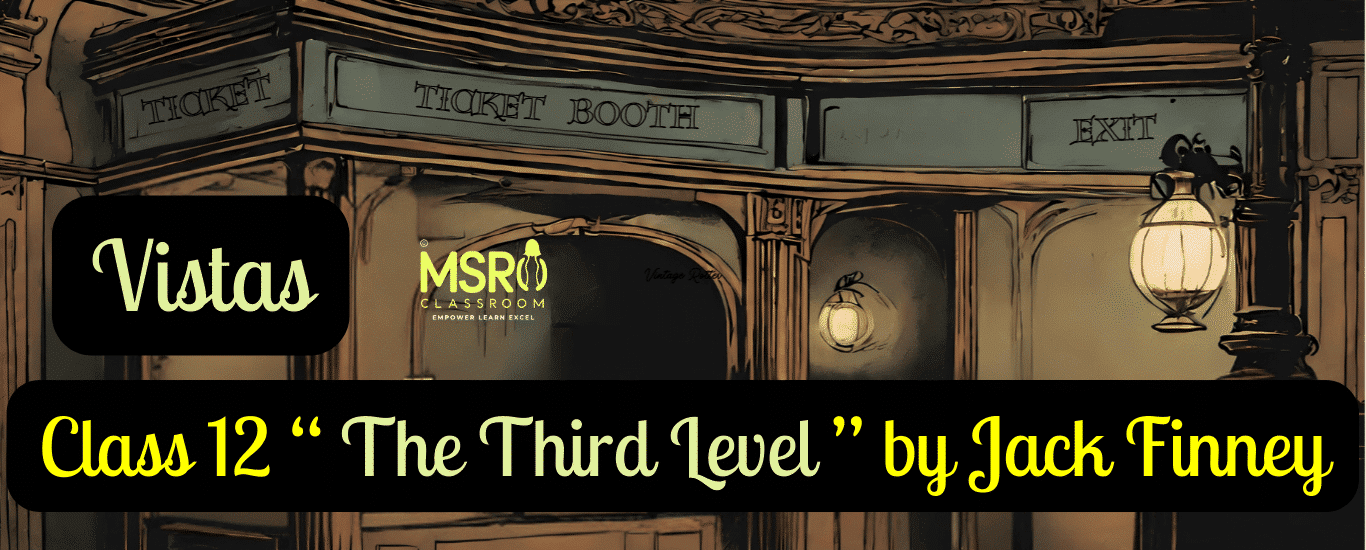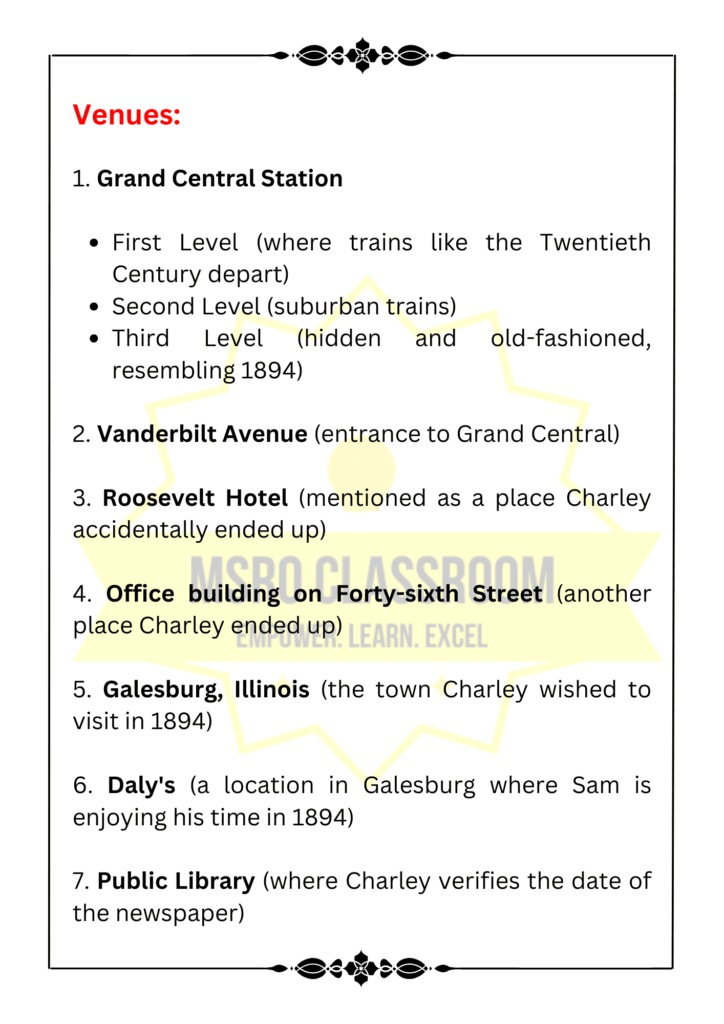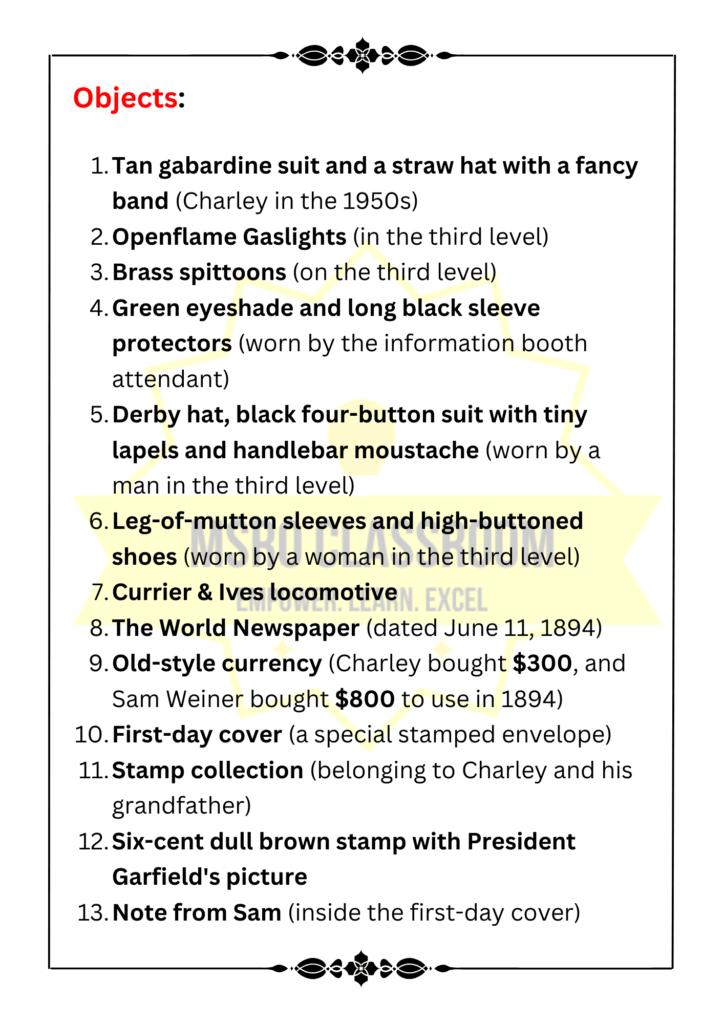Chapter 1, Vistas, Jack Finney’s “The Third Level” Summary, Theme, Character Sketch, Textbook Question Answers with Extra Questions.
Chapter 1- ‘The Third Level’ Summary, Theme & Analysis
Table of Contents
Next on Vistas: ‘The Tiger King‘ by Kalki
Summary ‘The Third Level’:
In “The Third Level” by Jack Finney, the protagonist, Charley, discovers a hidden third level at Grand Central Station that transports him back to 1894. Initially dismissed as a dream by a psychiatrist, Charley’s belief is validated when his friend Sam disappears and sends a letter from the past urging Charley and his wife to join him.
Sam, who used to be Charley’s psychiatrist, chose to stay in 1894 Galesburg, Illinois, fulfilling his dream of running a hay, feed, and grain business. Charley, intrigued by Sam’s letter and finding evidence of the third level’s existence, continues to search for it with his wife. The story explores themes of escapism, nostalgia, and the allure of simpler times.

SHOP: MSRO SMART NOTES: Class 12 English Literature
Themes in ‘The Third Level’:
Escapism and Nostalgia:
“The Third Level” by Jack Finney explores escapism, nostalgia, and the allure of the past. Through the protagonist’s discovery of a mysterious third level in Grand Central Station, the story delves into the desire to escape from the complexities and uncertainties of modern life.
The protagonist’s journey to a bygone era, represented by 1894, reflects a longing for simplicity, safety, and a romanticised view of the past.
The theme of nostalgia is further emphasised by the protagonist’s friend’s decision to remain in the past, highlighting the powerful pull of nostalgia and the quest for a simpler, more idyllic existence amidst the chaos of contemporary society.
Short Guide to ‘The Third Level’: Key Venues, Objects, and Characters:
Character Sketch:
Charley:
1. Description:
Charley is the protagonist of “The Third Level.” He is portrayed as an ordinary thirty-one-year-old man living in a bustling city. He appears to lead a typical life, working in an office and living with his wife, Louisa. Despite his seemingly mundane existence, Charley’s encounter with the mysterious third level at Grand Central Station sparks a profound curiosity.
2. Personality:
- Curious: Charley exhibits an inquisitive nature, which is evident in his exploration of the third level despite its enigmatic and potentially dangerous nature.
- Adventurous: His willingness to delve into the unknown and search for the third level demonstrates his adventurous spirit.
- Reflective: Charley’s contemplation of the implications of the third level, both for himself and his friend Sam, showcases his introspective nature.
3. Motivation:
- Escapism: Charley’s fascination with the third level stems from a desire to escape the complexities and uncertainties of modern life, suggesting a longing for a simpler, more idyllic existence.
- Nostalgia: His quest to find the third level reflects a deep yearning for nostalgia as he seeks to connect with a past era of 1894.
- Concern for Others: Charley’s concern for his friend Sam, who disappears after expressing interest in the third level, highlights his compassionate nature.
4. Role in the Story:
- Protagonist: Charley is the central character whose experiences with the third level drive the narrative forward.
- Catalyst for Exploration: His discovery of the third level leads to self-discovery and exploration of themes such as escapism and nostalgia.
- Symbol of Human Longing: Charley’s character symbolises the universal human longing for an escape from the complexities of modern life and a yearning for a simpler, more peaceful existence.
Charley’s character in “The Third Level” is characterised by his curious, adventurous, and reflective nature and his motivations of escapism, nostalgia, and concern for others. As the protagonist, he plays a central role in exploring the story’s themes and symbolises human longing for a romantic past.
Video Explanation ‘The Third Level’ by Jack Finney:
Duration: 7 minutes
Chapters/time stamps with subtitles are available.
Questions Answers ‘The Third Level’:
Reading With Insight:
Q1: Do you think that the third level was a medium of escape for Charley? Why?
A1: Yes, the third level serves as a medium of escape for Charley. He encounters a world that offers him respite from the troubles and uncertainties of his contemporary life. With its simplicity and tranquillity, the nostalgic allure of the past allows Charley to escape the stress and chaos of the modern world.
Q2: What do you infer from Sam’s letter to Charley?
A2: From Sam’s letter to Charley, it is inferred that Sam has successfully found and embraced the third level as an escape from the present. He expresses his joy and contentment at being in the past, inviting Charley and his wife to join him. Sam’s letter confirms the reality of the third level and encourages Charley to continue searching for it.
Q3: ‘The modern world is full of insecurity, fear, war, worry and stress.’ What are the ways in which we attempt to overcome them?
A3: In attempting to overcome the insecurities, fears, wars, worries, and stresses of the modern world, individuals may resort to various coping mechanisms. Some standard methods include seeking therapy or counselling, engaging in hobbies or recreational activities, practising mindfulness or meditation, building strong social support networks, and pursuing personal interests or passions.
Q4: Do you see an intersection of time and space in the story?
A4: Yes, the story intersects time and space. The third level of Grand Central Station is a gateway to a different period (1894) within the same physical space as the present-day station. This convergence of different temporal realities within a shared spatial environment demonstrates the narrative’s interconnectedness of time and space.
Q5: Apparent illogicality sometimes turns out to be a futuristic projection? Discuss.
A5: The apparent illogical elements in a story, such as the existence of a third level or the ability to travel back in time, can be seen as a form of futuristic projection. Although these elements may seem illogical or unbelievable initially, they offer imaginative explorations of alternative possibilities and potential advancements in science or technology. As society continues to evolve, what may seem illogical today could become feasible or even commonplace.
Q6: Philately helps keep the past alive. Discuss other ways in which this is done. What do you think of the human tendency to constantly move between the past, the present and the future?
A6: Philately, or stamp collecting, helps preserve the past by preserving historical artefacts and commemorating significant events, personalities, and cultural aspects. Other ways the past is kept alive include historical preservation efforts, such as museums, archives, and heritage sites; genealogy research and family history documentation; reenactments and living history events; and the study of literature, art, and music from different periods.
The human tendency to move between the past, present, and future reflects our complex relationship with time and our innate desire to understand and connect with our personal and collective histories while envisioning and shaping our futures.
Q7: You have read ‘Adventure’ by Jayant Narlikar in Hornbill Class XI. Compare the interweaving of fantasy and reality in the two stories.
A7: Both “Adventure” by Jayant Narlikar and “The Third Level” by Jack Finney skillfully interweave fantasy and reality. However, they approach this blending in distinct ways.
In “Adventure,” fantasy emerges through Professor Gaitonde’s unexpected journey into an alternate reality, triggered by a collision and contemplation of historical events. This fantastical element contrasts sharply with the familiar reality he navigates, prompting reflection on the nature of existence and historical divergence.
On the other hand, “The Third Level” blends fantasy with reality by discovering a hidden subway station that connects to a parallel world from the past. Charley’s exploration of this mysterious level blurs the lines between reality and fantasy, challenging his perception of time and reality.
While both stories incorporate fantasy elements within a predominantly realistic setting, they explore different themes and concepts. “Adventure” reaches into alternate history and existential questions, while “The Third Level” explores the allure of escapism and the possibility of transcending time and space.

SHOP: MSRO SMART NOTES: Class 12 English Literature
Extra Questions ‘The Third Level’:
Short Answer Type Questions:
Q1: What is the premise of “The Third Level” by Jack Finney?
A1: The protagonist, Charley, discovers a mysterious third level at Grand Central Station, which transports him to 1894. He receives a letter from a friend who disappeared into this level, urging him to find it, too.
Q2: How does Charley describe his encounter with the third level?
A2: Charley describes accidentally stumbling upon the third level, noticing its old-fashioned appearance, and realising he has travelled back to the late 19th century.
Q3: What does Charley try to do on the third level?
A3: Charley attempts to buy tickets to Galesburg, Illinois, in 1894, longing for the peaceful past and escaping the modern world’s troubles.
Q4: What happens when Charley tries to pay for the tickets?
A4: The clerk refuses Charley’s modern currency, prompting him to flee as he realises the money is incompatible with the period.
Q5: How does Charley verify the authenticity of his friend’s letter?
A5: Charley finds a first-day cover envelope among his stamp collection, postmarked from 1894 and addressed to his grandfather in Galesburg. The envelope contains a message from his friend Sam.
Q6: What does Sam’s message to Charley reveal?
A6: Sam’s note confirms his discovery of the third level and invites Charley and his wife to join him in the past and experience the peaceful life in Galesburg.
Q7: How does Charley react to Sam’s message?
A7: Charley becomes intrigued and determined to find the third level again, recognising its potential for escape from present-day worries and responsibilities.
Q8: How does Charley’s psychiatrist friend interpret his experience with the third level?
A8: Charley’s psychiatrist friend views the third level as a manifestation of his subconscious desire to escape from the stresses and uncertainties of modern life, attributing it to a form of wish fulfilment driven by discontentment.
Q9: What does Charley’s stamp-collecting hobby represent to his psychiatrist friend?
A9: Charley’s stamp-collecting hobby is seen as a temporary refuge from reality, indicative of his longing for a simpler and more peaceful existence, akin to his desire to escape to the third level.
Q10: How does Charley’s reaction to his friend’s disappearance differ from his psychiatrist’s interpretation?
A10: While Charley’s psychiatrist attributes his friend’s disappearance to a desire to escape, Charley sees it as proof that the third level is real and actively seeks to find it, driven by the hope of experiencing the idyllic past himself.
Long Answer Type Questions:
Q1: What does Charley claim about the existence of a third level at Grand Central Station?
A1: Charley claims that there is a third level at Grand Central Station, despite the presidents of the New York Central and New York, New Haven, and Hartford railroads insisting there are only two. He recounts accidentally discovering this third level one night while trying to catch the subway home. Charley describes the third level as frozen in time, resembling 1894.
He vividly describes the old-fashioned attire, gaslights, and antiquated currency. Despite scepticism from others, including his psychiatrist friend, who attributes it to wish fulfillment, Charley maintains the reality of the third level and continues to search for it, especially after his friend Sam disappears and confirms its existence through a letter.
Q2: How does Charley’s psychiatrist friend interpret his experience of the third level?
A2: Charley’s psychiatrist friend interprets his experience of the third level at Grand Central Station as a form of “waking dream wish fulfillment.” He suggests that Charley’s longing to escape from the modern world’s insecurity, fear, and worry manifests in his subconscious desire to find an alternate reality.
Despite Charley’s insistence on the third level’s existence, his friend attributes it to psychological factors, implying that Charley’s unhappiness and desire for escape drive him to create this fantastical narrative.
While Charley’s psychiatrist friend acknowledges the typical human inclination to seek refuge from reality, he views Charley’s experience as a psychological coping mechanism rather than a literal discovery of a hidden dimension.
Q3: What personal item does Charley mention as evidence of his journey to the third level?
A3: Charley mentions a first-day cover, a stamped envelope mailed to his grandfather in Galesburg, Illinois, on July 18, 1894, as evidence of his journey to the third level at Grand Central Station.
This unexpected discovery among his oldest first-day covers serves as a tangible link to the past and confirms the reality of his experience. The envelope, addressed to his grandfather, contains a handwritten note from his friend Sam, who claims to have found the third level and invites Charley and his wife, Louisa, to join him there.
This personal item validates Charley’s encounter with the third level and connects him directly to the mysterious and seemingly impossible journey back in time.
Q4: How does Charley describe the appearance of the third level at Grand Central Station?
A4: Charley describes the appearance of the third level at Grand Central Station as a scene frozen in the year 1894. He notices significant differences from the present-day station, such as fewer ticket windows and train gates, an old-looking information booth in the centre, and dim, flickering gaslights illuminating the area.
The attire of the people present, including a man with a derby hat, a black suit, and a handlebar moustache, further indicates the period’s authenticity. Charley observes brass spittoons on the floor, open-flame gaslights, and individuals dressed in nineteenth-century fashion with beards, sideburns, and elaborate moustaches. These details collectively create a vivid image of a bygone era, transporting Charley to a time long before his own.
Q5: Charley finds a newspaper from what year on the third level, and what does it suggest about the period?
A5: Charley finds a newspaper from 1894 on the third level at Grand Central Station. Specifically, he discovers a copy of The World with a lead story referencing President Cleveland, dated June 11, 1894. This newspaper serves as a tangible artefact confirming the period of the third level.
Its content, mentioning President Cleveland, provides historical context, indicating that Charley has travelled back to the late nineteenth century. The presence of such a newspaper, along with other period-specific details like attire and currency, solidifies the authenticity of the third level as a portal to the past, offering Charley a glimpse into a bygone era.
Q6: How does Charley attempt to purchase tickets on the third level, and what is the outcome?
A6: Charley attempts to purchase tickets on the third level at Grand Central Station using modern currency. Despite his desire to buy tickets to Galesburg, Illinois, in 1894 to relive peaceful moments from his childhood, he realises that the money he presents needs to be recognised by the ticket clerk.
The clerk, noticing the outdated appearance of the currency, accuses Charley of trying to deceive him and warns him against attempting to defraud.
Realising his mistake and the potential consequences, Charley quickly retreats from the ticket counter without purchasing any tickets. This encounter highlights the stark contrast between the present and the past on the third level and the challenges of navigating between different temporal realities.
****







